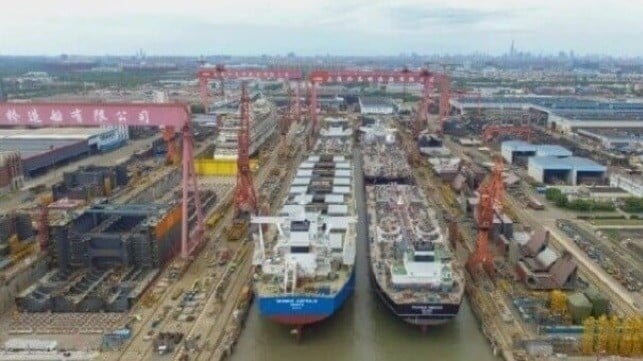Report: US to Declare China’s Use of Unfair Trade Practices in Shipbuilding

The U.S. Trade Representative’s office had reportedly concluded China is using unfair policies and practices to dominate the shipbuilding industry as well as the global maritime and logistics sectors. The finding comes as China in 2024 moved into the dominant position in newbuilding orders scoring as much as 70 percent of the orders and widening the gap with South Korea its nearest rival.
According to an exclusive report from Reuters, Katherine Tai who leads the efforts to oversee U.S. trade has concluded a nearly 10-month investigation into the shipbuilding industry and will release the final report by the end of this week. The investigation was launched in April 2024 in response to a formal complaint filed by a coalition of five U.S. unions representing steelworkers, machinists, and shipbuilders.
China the report will conclude according to Reuters is using “unjustifiable” or “unreasonable” business practices. Under the Trade Act of 1974, the U.S. Trade Representative has the power to investigate and penalize countries involved in unfair trade which is a burden to U.S. commerce.
The unions supported by U.S. senators highlighted the plans of China’s Central Government to build up the shipbuilding industry over the past 20 years. They alleged China had taken actions to seize market share, suppress prices, and create a worldwide network of ports and logistics infrastructure.
Reuters reports Tai will cite the financial support provided by the government to the shipbuilding industry as well as efforts to “artificially suppress China’s labor costs in the maritime, shipbuilding, and logistics sectors.” Further, the report will say China has engaged in forced technology transfers, intellectual property theft, and procurement policies to give its shipbuilders an advantage.
China last year lashed out at the call for the trade investigation. China’s Ministry of Commerce said the complaint “lacks factual basis.” Chinese media cited the reference to “so-called subsidies” by the U.S. steelworkers and other unions as “totally untenable.”
It is unclear what penalties the U.S. might seek to invoke against the Chinese shipbuilding industry. U.S. flag shipping does not build ships in China and has limited use of the yards for overhauls or other conversion projects such as Matson’s LNG conversions of three containerships. Reuters quotes one source saying “a process will be laid out to try to stop the erosion of the U.S. shipbuilding industrial base and to start it growing again.” Reuters asserts there are just 20 public and private shipyards in the U.S. down from over 300 in the early 1980s.
The unions when they filed the complaint called for steps including a port fee on Chinese-built ships that dock in the U.S. They also proposed a fund to help the U.S. shipbuilding industry.
Coming at the end of the Biden administration, the enforcement of the decision will fall to the Trump administration. Donald Trump could use the finding as a further justification for his plan to impose tariffs of up to 60 percent on Chinese-made imports.
Reuters highlights that Trump’s incoming national security adviser Mike Waltz was part of the effort to develop the proposed SHIPS for America Act (Shipbuilding and Harbor Infrastructure for Prosperity and Security) legislation pending in Congress. It is billed as the first comprehensive strategy to rebuild America’s maritime sector and includes proposals such as a requirement for a portion of U.S. imports from China to be carried on U.S.-flagged ships.
